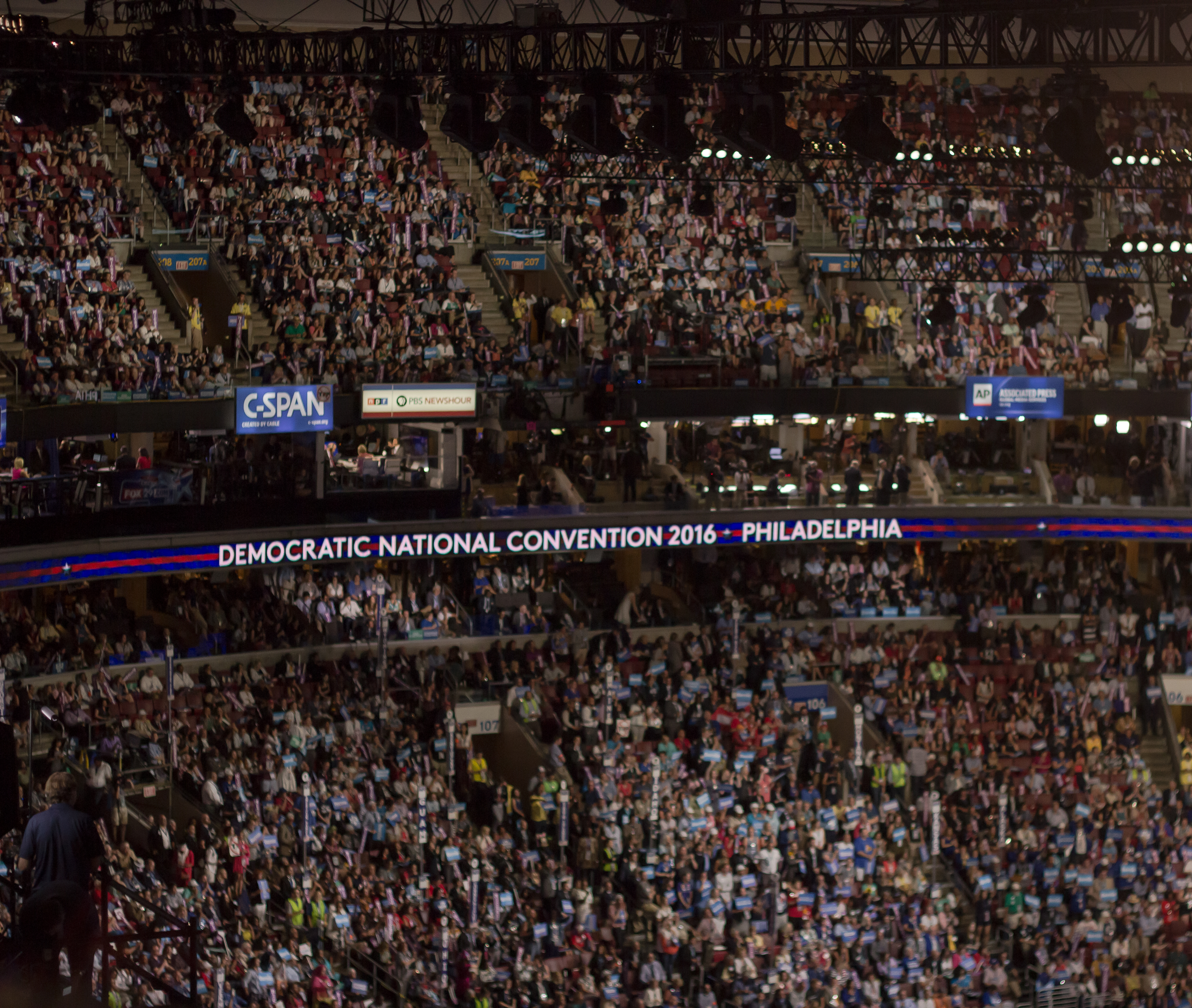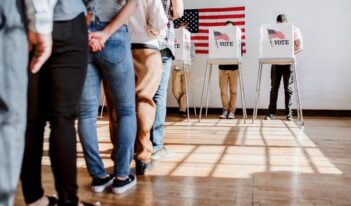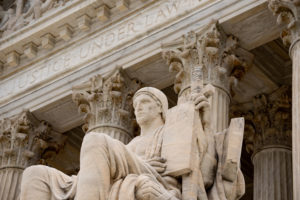
Democratic leaders continued their push to unite the Party in the face of lingering frustrations among Clinton’s critics.
Thousands gathered in Philadelphia on Wednesday for the third day of the Democratic National Convention, which was fittingly titled, “Working Together”—a theme that was on full display throughout the evening, as the Party continued its push to present a united front after several days of discord. The day’s speakers praised Hillary Clinton, while also heaping praise on President Obama as they expressed their desire to build on his work under a new Democratic administration. President Obama himself closed out the evening with a speech before thousands of people in the filled-to-capacity arena, giving a ringing endorsement of Clinton and making an impassioned call for Party unity.
The Convention’s earlier focus on gun violence continued on Wednesday, with an appearance by former U.S. Representative Gabrielle Giffords (D-Ariz.), who founded Americans for Responsible Solutions to advocate for gun control after she was gravely wounded in a mass shooting. Speakers throughout the day advocated for legislation to improve gun safety, including a reinstatement of the assault weapons ban.
U.S. Senator Chris Murphy (D-Conn.), who recently led a 15-hour filibuster to push for a vote on gun safety measures following the Orlando nightclub shooting, said Congress “has done absolutely nothing to prevent the next massacre.” He called for legislation that would close loopholes that allow some gun sales to happen without a background check and prevent people on the terrorism no-fly list from purchasing firearms.
A host of speakers discussed healthcare issues—particularly women’s access to healthcare—including Representative Maxine Waters (D-Calif.) and Ilyse Hogue, President of NARAL Pro-Choice America. Hogue pressed upon the importance of the election for preserving Roe v. Wade and a woman’s right to choose, while New York City Mayor Bill de Blasio praised Clinton’s contributions to children’s healthcare in light of her help passing the Children’s Health Insurance Program.
Senate Minority Leader Harry Reid (D-Nev.) acclaimed the efforts of Democrats during the Obama Administration to improve healthcare and increase government oversight and regulation of Wall Street. Reid called out what he referred to as the “hateful rhetoric” of Donald Trump and called Clinton “the most qualified and prepared candidate in the history of America.”
California Governor Jerry Brown (D-Calif.) touted his state as a counterexample to the argument that more regulation is bad for the economy. He argued that is a false choice to have to choose between saving the climate through aggressive regulation of greenhouse gases or helping the economy. Brown praised the Paris Agreement and lamented the extreme division between the two major political parties over climate change.
Other speakers urged unity and acceptance in the face of divisive culture wars, with specific references made to the Public Facilities Privacy & Security Act—North Carolina’s so-called “bathroom bill”—and to the controversial religious objections bill that Indiana Governor and Vice Presidential Nominee Mike Pence signed into law last year, , which prohibits governmental entities from substantially burdening the ability of people, businesses, and organizations to exercise their religious beliefs.
Former New York City Mayor Michael Bloomberg endorsed Clinton for President in what he called “an unconventional convention speech.” Citing climate change and gun violence as some of the reasons he refused to support Trump’s candidacy, he urged his fellow Independent Party members to cast their vote for Clinton. He called Clinton “a problem solver, not a bomb thrower,” and asserted that she is “the responsible choice in this election.”
Vice President Joe Biden spoke at length about the middle class and the importance of electing a candidate that will build up working Americans. Biden’s speech was followed by his potential successor, U.S. Senator Tim Kaine (D-Va.). Kaine introduced himself to the nation with stories from his childhood, including his experience working for his family’s business during summers and weekends. Kaine also discussed his record on gun control, noting that he closed the gun sale background check loophole when he was governor of Virginia, which he achieved in part by reached across the political aisle to disaffected Republicans.
A point that many of the speakers returned to throughout the evening was what they described as the unusual level of detail that Clinton has provided about her plans to achieve her goals and keep her campaign promises, if elected President. Kaine contrasted Clinton’s policy proposals with what he called Trump’s “empty promising” habits—a dig at Trump that echoed Bloomberg’s critique that Trump’s stances on issues such as trade and job creation are inconsistent with Bloomberg’s own policies and business record. “The richest thing about Donald trump is his hypocrisy,” Bloomberg asserted.
President Obama gave the final speech of the night after taking the stage to thunderous applause. The President enumerated his achievements, praising his Administration for transforming healthcare through the enactment of the Patient Protection and Affordable Care Act, and for addressing climate change through the adoption of the Paris Agreement. Obama spoke of Clinton as an exceptionally qualified and experienced candidate, quipping, “She was doing everything I was doing, but just like Ginger Rogers, it was backwards in heels.”
Just as President Obama concluded his remarks and the night appeared to be drawing to a close, Hillary Clinton made a surprise appearance. Before an ecstatic crowd, she joined the President on stage—marking their first joint appearance since she was officially declared the Democratic Party’s presidential nominee, and signaling a continued effort to unite against a Republican nominee whose policies significantly depart from their own.



